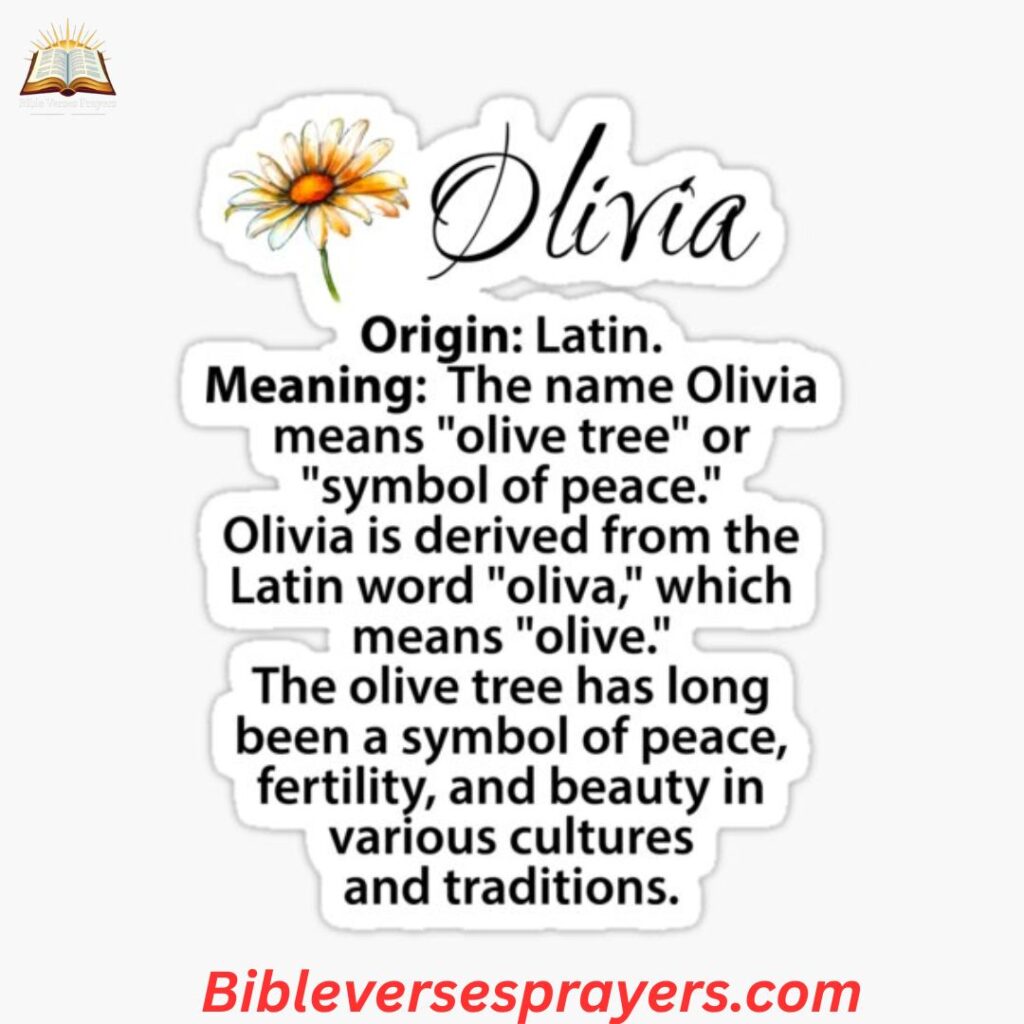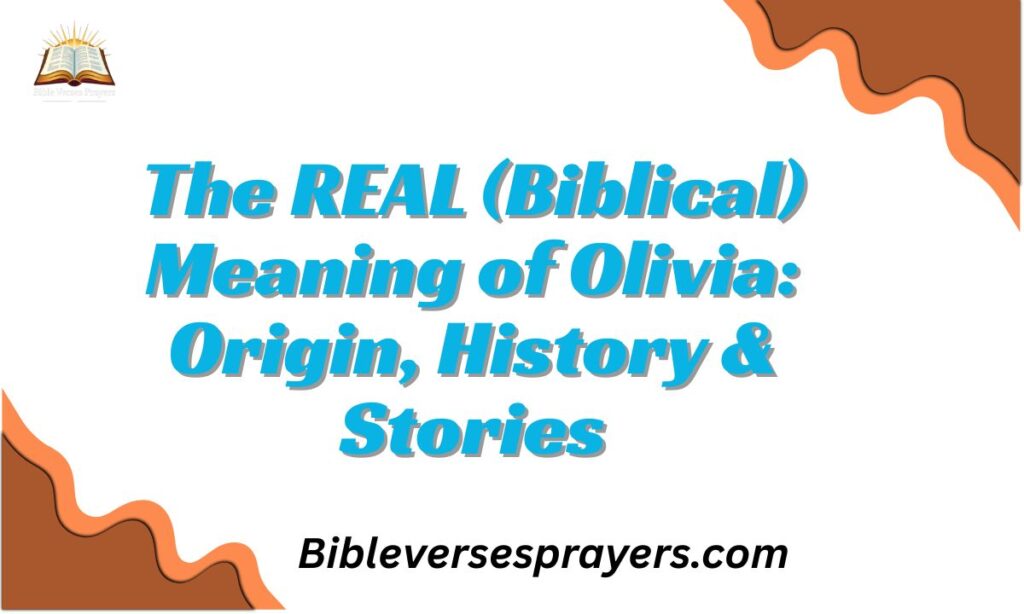The name Olivia carries a sense of grace, peace, and timeless beauty. Rooted in the Latin word oliva, meaning “olive tree,” this name has deep connections to both ancient history and biblical symbolism.
The olive tree has long represented peace, anointing, and divine blessing in Scripture. Although Olivia itself does not appear directly in the Bible, its meaning is woven throughout biblical stories and symbols from the olive branch of Noah’s ark to the Mount of Olives where Jesus prayed.
This beautiful name reflects faith, new beginnings, and spiritual growth, making it one of the most meaningful names for girls today.
What Does Olivia Mean in Hebrew?
While “Olivia” itself is not a Hebrew name, its meaning is deeply rooted in biblical imagery. Olivia derives from the Latin word “oliva,” meaning “olive” or “olive tree.” In Hebrew, the olive tree is called “zayit” (זַיִת), one of the most sacred and symbolically rich trees mentioned throughout the Bible.
The olive tree appears over 30 times in Scripture and represents peace, prosperity, divine blessing, and the very presence of God. When we understand Olivia through this lens, the name carries profound spiritual weight.
The Origins of Olivia in the Bible

The name Olivia traces its roots to the Latin word oliva, meaning “olive tree,” a symbol deeply woven into biblical history. Although the name itself isn’t found in Scripture, the olive tree appears throughout the Bible as a sign of peace, blessing, and God’s favor.
From the Garden of Eden’s creation of fruit-bearing trees to the olive branch brought back by the dove in Noah’s story, the olive tree represents new beginnings and divine renewal. In this way, the meaning of Olivia carries the same sacred essence — peace, life, and spiritual connection with God.
Garden of Eden
The olive tree’s biblical story begins in the earliest chapters of human history. After the great flood, Noah sent out a dove to search for dry land. The dove returned carrying an olive leaf in its beak, signaling that God’s judgment had passed and new life was emerging from the waters. This moment established the olive branch as an eternal symbol of peace, hope, and divine mercy.
The olive tree itself thrives in the Mediterranean climate of biblical lands, and its cultivation was essential to ancient Israelite life. Olive oil illuminated their homes, anointed their priests and kings, and sanctified their worship.
The Biblical Meaning of Olivia
The biblical meaning of Olivia centers around the sacred symbolism of the olive tree — a powerful emblem of peace, anointing, and new beginnings. Throughout Scripture, olive oil was used to anoint kings and priests, representing God’s blessing and divine purpose.
The olive branch, seen in the story of Noah, became a sign of restoration and hope after the flood. Likewise, the Mount of Olives served as a place of prayer and peace for Jesus. Altogether, the name Olivia beautifully embodies faith, renewal, and a life touched by God’s grace.
Anointing
Perhaps the most sacred connection to the name Olivia comes through olive oil’s role in anointing. The Hebrew word “Messiah” and Greek word “Christ” both mean “anointed one.” Kings like David and Saul were anointed with olive oil as a sign of God’s selection and empowerment.
The prophet Samuel anointed David with olive oil, declaring God’s favor upon him: “So Samuel took the horn of oil and anointed him in the presence of his brothers, and from that day on the Spirit of the LORD came powerfully upon David” (1 Samuel 16:13).
Those who bear the name Olivia carry this symbolism of being set apart for God’s purposes, chosen and empowered by the Holy Spirit.
New Beginnings
The olive branch that the dove brought to Noah represents fresh starts and redemption. After devastation and judgment, God offered humanity another chance. The olive leaf was proof that life was returning to earth, that God’s mercy triumphs over judgment.
Olivia embodies this promise of renewal—that no matter what has passed, God offers hope and restoration. Every ending contains the seed of a new beginning, just as the olive tree produces new growth year after year.
Place of Rest (Mount of Olives)
The Mount of Olives holds tremendous significance in Scripture. This ridge east of Jerusalem was covered with olive groves and served as a place where Jesus frequently went to pray and teach. The Garden of Gethsemane, where Jesus prayed before His crucifixion, was an olive garden on the Mount of Olives.
“Jesus went out as usual to the Mount of Olives, and his disciples followed him” (Luke 22:39). This mountain was Jesus’ sanctuary—a place of communion with the Father, of agonizing prayer, and ultimately of redemption.
The name Olivia connects to this sacred space where heaven touched earth, where the divine will meet human surrender.
The Spiritual Meaning of Olivia

The spiritual meaning of Olivia reflects light, peace, and growth — qualities symbolized by the olive tree throughout the Bible. Spiritually, the name carries a message of calmness, inner strength, and divine favor.
Just as olive oil was used to bring light to the temple and anoint the chosen, Olivia represents a soul that shines with faith and purpose. It reminds believers to live peacefully, nurture spiritual growth, and let their light guide others toward God’s love and truth.
Peace
Above all else, the olive branch symbolizes peace. From Noah’s dove to modern symbols of reconciliation, the olive represents harmony between God and humanity, and peace among people.
A person named Olivia is called to be a peacemaker. “Blessed are the peacemakers, for they will be called children of God” (Matthew 5:9). The name carries a mission to bring reconciliation, to bridge divides, and to spread the peace of Christ wherever she goes.
Light
Olive oil fueled the lamps of ancient Israel. The menorah in the tabernacle and temple burned pure olive oil continually, representing God’s eternal presence among His people. This light never went out—it was a perpetual flame maintained by the priests.
Olivia shares in this symbolism of illumination. Jesus called His followers “the light of the world” (Matthew 5:14), and those who bear names connected to olive oil are reminded of their calling to shine in darkness, to bring truth and hope to a world desperately seeking guidance.
Growth
The olive tree is remarkably resilient and long-lived. Some olive trees in Israel are over 2,000 years old, their gnarled trunks bearing witness to centuries of history. These trees continue producing fruit even in their ancient age, demonstrating endurance, faithfulness, and fruitfulness.
Psalm 52:8 declares, “But I am like an olive tree flourishing in the house of God; I trust in God’s unfailing love for ever and ever.” The olive tree represents steady spiritual growth, deep roots in God’s Word, and the ability to bear fruit regardless of circumstances.
What Bible Verses Contain Olivia?
While the name “Olivia” doesn’t appear in Scripture, numerous verses reference olives and olive trees, each carrying significance for those who bear this name:
- Romans 11:17-24 – Paul uses the olive tree as a powerful metaphor for God’s people, describing both natural branches and grafted-in branches, illustrating God’s inclusive love and faithfulness.
- Zechariah 4:3 – Two olive trees stand beside the lampstand, representing the Spirit’s unlimited supply of oil—God’s abundant provision for His work.
- Judges 9:8-9 – In Jotham’s parable, the olive tree is honored above other trees, refusing to leave its position of providing oil “by which both gods and humans are honored.”
- Psalm 128:3 – “Your wife will be like a fruitful vine within your house; your children will be like olive shoots around your table.” Here, olive shoots represent blessing, prosperity, and family heritage.
- Revelation 11:4 – The two witnesses are described as “two olive trees and two lampstands,” connecting the imagery of olive oil, light, and faithful testimony.
Stories About Olivia in the Bible?
Though no woman named Olivia appears in Scripture, we can reflect on biblical women who embody the qualities that Olivia represents:
- The Widow’s Oil (2 Kings 4:1-7) – A poor widow had only a small jar of olive oil. Through Elisha’s prayer, God multiplied that oil miraculously, filling every vessel in her home. This oil saved her family from slavery and provided for their needs. Like the name Olivia, this story reminds us that what seems small in our hands becomes abundant in God’s.
- The Wise and Foolish Virgins (Matthew 25:1-13) – Jesus told a parable about ten bridesmaids waiting for the bridegroom. Five were wise and brought extra olive oil for their lamps; five were foolish and ran out. The oil represents preparedness, wisdom, and staying ready for Christ’s return. Those who carry the name Olivia are called to be among the wise—always prepared, always ready, their lamps burning brightly.
- Mary’s Anointing of Jesus (John 12:1-8) – Mary of Bethany anointed Jesus’ feet with expensive perfumed oil, an act of extravagant love and worship. Though not specifically olive oil, this anointing demonstrates the sacrificial devotion that the symbolism of Olivia calls us toward—holding nothing back in our love for Christ.
- Gethsemane’s Garden (Matthew 26:36-46) – In the olive garden of Gethsemane, Jesus wrestled with His impending death, ultimately surrendering to the Father’s will. The name Olivia connects to this sacred ground where obedience, sacrifice, and love converged. It reminds us that true peace comes through surrender to God’s purposes.
Final Thoughts
The name Olivia, though not directly biblical, is saturated with scriptural symbolism and spiritual significance. It speaks of peace in a world of conflict, light in the midst of darkness, and fruitfulness that comes from deep roots in God’s love.
Every Olivia is called to embody the characteristics of the olive tree—resilient, fruitful, providing sustenance and light to others, and deeply rooted in faith. She is called to be a peacemaker, a light-bearer, and someone who brings hope and new beginnings wherever she goes.
Frequently Asked Questions
Is Olivia mentioned in the Bible?
No, the name Olivia doesn’t appear in Scripture. However, it derives from the Latin word for “olive,” and olive trees are mentioned extensively throughout the Bible with deep symbolic meaning.
What is the Hebrew equivalent of Olivia?
The Hebrew word for olive is “zayit” (זַיִת). While not a direct equivalent, Hebrew names like Zayit or related names carry similar meaning.
Is Olivia a Christian name?
While Olivia originated as a Latin name popularized by Shakespeare, its connection to the biblical olive tree gives it strong Christian symbolism and meaning.
What does it mean to be “like an olive tree” in the Bible?
Psalm 52:8 uses this metaphor to describe someone who trusts in God’s unfailing love, flourishes in God’s presence, and bears fruit throughout their life.
Why is olive oil important in the Bible?
Olive oil was used for anointing kings and priests, fueling lamps in the temple, healing, cooking, and trade. It represented the Holy Spirit, consecration, joy, and God’s provision.

David Smith is an experienced SEO expert and the founder of BibleVersesPrayers.com, a platform dedicated to sharing the truth, hope, and power of God’s Word through meaningful Bible verses and heartfelt prayers.






